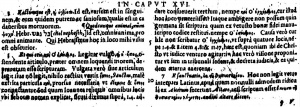Revelation 16:5 Beza 1598
From Textus Receptus
Beza himself comments on this change in a marginal note of his Greek New Testament:
- "And shall be": The usual publication is "holy one," which shows a division, contrary to the whole phrase which is foolish, distorting what is put forth in scripture. The Vulgate, however, whether it is articulately correct or not, is not proper in making the change to "holy," since a section (of the text) has worn away the part after "and," which would be absolutely necessary in connecting "righteous" and "holy one." But with John there remains a completeness where the name of Jehovah (the Lord) is used, just as we have said before, 1:4; he always uses the three closely together, therefore it is certainly "and shall be," for why would he pass over it in this place? And so without doubting the genuine writing in this ancient manuscript, I faithfully restored in the good book what was certainly there, "shall be." So why not truthfully, with good reason, write "which is to come" as before in four other places, namely 1:4 and 8; likewise in 4:3 and 11:17, because the point is the just Christ shall come away from there and bring them into being: in this way he will in fact appear setting in judgment and exercising his just and eternal decrees.
(Theodore Beza, Nouum Sive Nouum Foedus Iesu Christi, 1589. Translated into English from the Latin footnote.) It also appears in Beza's 1598 Greek New Testament.
Contents |
And Shall Be
- "And shall be": The usual publication is "holy one," which shows a division, contrary to the whole phrase which is foolish, distorting what is put forth in scripture.
Beza came to this conclusion in 1589. He mentions that "holy one" - "shows a division" in scripture. What exactly is he saying here?
Latin Vulgate
The Vulgate has "..es qui es et qui eras sanctus.." which translates as "..are the one who are and who wast, the Holy.."
Revelation 1:4
But with John there remains a completeness where the name of Jehovah (the Lord) is used, just as we have said before, 1:4; he always uses the three closely together, therefore it is certainly "and shall be," for why would he pass over it in this place?
- Revelation 1:4 John to the seven churches which are in Asia: Grace be unto you, and peace, from him which is, and which was, and which is to come; and from the seven Spirits which are before his throne;
See also, Revelation 1:8; 4:3 and 11:17,
Beza's Ancient Manuscript
- And so without doubting the genuine writing in this ancient manuscript, I faithfully restored in the good book what was certainly there, "shall be."
Beza mentions here an ancient Greek manuscript. Jeffrey Khoo says:
- Besides the ancient Greek manuscript that Beza had, it ought to be noted that Beatus of Liebana in the eighth century, in his compilation of commentaries on the Book of Revelation has the Latin phrase, qui fuisti et futures es, for Revelation 16:5 which was found in the commentary of Tyconius which goes back to the fourth century.51 It is entirely possible that there were either early Greek manuscripts or Old Latin versions as early as the fourth century which contained the reading esomenos. [1]


